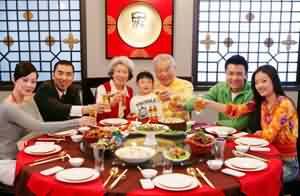|
Chinese New Year Celebration is the most important celebration of the year. Chinese people may celebrate the Chinese New Year in slightly different ways but their wishes are almost the same; they want their family members and friends to be healthy and lucky during next year.
Chinese New Year Celebration usually lasts for 15 days. Celebratory activities include Chinese New Feast, firecrackers, giving lucky money to children, the New Year bell ringing and Chinese New Year Greetings. Most of Chinese people will stop the celebrating in their home on the 7th day of New Year because the national holiday usually ends around that day, however celebrations in public areas can last until the 15th day of New Year.
2017 is the year of the Rooster in the Chinese zodiac. Rooster years:...1921, 1933, 1945, 1957, 1969, 1981, 1993, 2005, 2017, 2029… If you were born in a year listed, then you are a Rooster.
House CleaningTo clean houses on the New Year Even is a very old custom dating back to thousands of years ago. The dust is traditionally associated with “old” so cleaning their houses and sweeping the dust mean to bid farewell to the “old” and usher in the “new”. Days before the New Year, Chinese families clean their houses, sweeping the floor, washing daily things, cleaning the spider webs and dredging the ditches. People do all these things happily in the hope of a good coming year.
House decorationOne of the house decorations is to post couplets on doors. On the Spring Festival couplets, good wishes are expressed. New Year couplets are usually posted in pairs as even numbers are associated with good luck and auspiciousness in Chinese culture. People in north China are used to posting paper-cut on their windows. When sticking the window decoration paper-cuts, people paste on the door large red Chinese character  A red A red  means good luck and fortune, so it is customary to post means good luck and fortune, so it is customary to post on doors or walls on auspicious occasions such as wedding, festivals. on doors or walls on auspicious occasions such as wedding, festivals.
Couplets
The couplets of the Spring Festival are couplets hung on the columns of a hall in the Spring Festival’s Eve. It is called “Chun Lian” (春联) in Chinese. Being a unique literary form to China, the Couplets of the Spring Festival mostly describe the bustling atmosphere during the Spring Festival and express Chinese people’s hopes for prosperity in the New Year. The origin of the couplets of the Spring Festival is “Tao Fu” (peach wood charms against evil). The history of Tao Fu can be traced back to more than 3000 years ago. At that time, people wrote the names of two gods who can control evil spirits on two pieces of peach wood. And Tao Fu evolved into today’s couplets in Spring Festival in Song Dynasty (960 A.D. — 1279 A.D.), and the peach wood was gradually replaced by two piece of paper. Except that the couplets of the Spring Festival in Buddhist temples are written on yellow paper, the couplets are usually written on red paper because red is the color of peach wood, and the color of red can bring good luck and defeat evil spirits. However, when there is a death in the family, the younger generation of the deceased cannot use red paper to write couplets of Spring Festival for three years in a row. They use white paper in the first year, green paper in the second year and yellow paper in the last year. In some places, the younger generation even cannot use couplets during Spring Festival for three year to show their respect for the deceased. Mostly, the couplets of Spring Festival are glued to the front door frame. Sometimes, families also paste couplets on the doors of pigpen, kennel, pheasantry and so on, hoping that the domestic animals are all thriving and healthy. Some families even paste couplets on both sides of the picture or statue of a god or the Buddha, hoping that the god or Buddha can bless the whole family and give them a smooth and prosperous year. Generally, The Spring Couplet is composed of two antithetical sentences on both sides of the door. The couplets are read from top to bottom and the first line starts from the right. Apart from the two lines, some couplets even have a horizontal scroll bearing an inscription, usually an auspicious phrase, above the gate. It is read from right to left.
Family Reunion Dinner at Chinese New Year's Eve

Spring Festival is a time for family reunion. The New Year's Feast is "a must" banquet with all the family members getting together. The food eaten on the New Year Even banquet varies according to regions. In south China, It is customary to eat "niangao" (New Year cake made of glutinous rice flour) because as a homophone, niangao means "higher and higher every year". In the north, a traditional dish for the feast is "Jiaozi" or dumplings shaped like a crescent moon.
The dinner on New Year’s Evening is also known as a family reunion dinner. It is one of the most important events in the New Year’s Evening. It reflects how Chinese society values the importance of family. The dinner on New Year’s Evening give all the family members a chance to get together and enjoy the happiness of a family union.
When children are out playing and shooting off firecrackers, the housewives are busy in the kitchen, preparing for the family reunion dinner. What’s more, the dumplings to eat on the first day of the New Year should also be made in this evening.
The dinner on New Year’s Evening should be very sumptuous and traditionally include fish. This is because fish in Chinese pronounced as “Yu” (鱼), same with the pronunciation of the Chinese character “余” in the phrase of “年年有余” (meaning may you always get more than you wish for every year). So fish symbolizes surplus or success in Chinese culture.
From the cultural meaning of fish, we can see that the food items chosen in the dinner on New Year’s Evening are quite recherché and dainty. Usually, a typical family reunion dinner on New Year’s Evening includes the following food items:
Dumplings (Jiao Zi): In the northern part of China, dumplings are essential to the dinner on New Year’s Evening, because the shape of a dumpling resembles an ancient Chinese gold ingot. Usually the housewives like to put a coin in on dumpling when making the dumplings, and the one who by chance to eat this specific dumpling is believed to have a lucky and prosperous year.
New Year Cake (Nian Gao): The New Year Cake is also important to the dinner on New Year’s Evening, because the pronunciations of it is a homophone for “年高” (meaning a more prosperous year). It is mostly made of sticky rice and sugar, and some other ingredients according to personal tastes.
Noodles: Many families eat noodles on New Year’s Evening because noodles represent longevity and long life. However, this practice is not limited to the dinner on New Year’s Evening.
Chicken: The importance of chicken is the same with that of fish. The pronunciation of chicken in Chinese (Ji) is a homophone for “吉” meaning good luck.
Traditionally, most of the dishes in the dinner of New Year’s Evening are not healthy, with high fat and high heat. However, with the upturn of Chinese people’s living standards, the dinner of the New Year’s Evening is becoming healthier and healthier, and more and more vegetables are appearing in this significant dinner.
Waiting for the First Bell Ringing of Chinese New Year
The first bell ringing is the symbol of Chinese New Year. Chinese people like to go to a large squares where there are huge bells are set up on New Year’s Eve. As the New Year approaches they count down and celebrate together. The people believe that the ringing of huge bell can drive all the bad luck away and bring the fortune to them. In recent years, some people have begun going to mountain temples to wait for the first ringing. Hanshan Temple in Suzhou , is very famous temple for its first ringing of the bell to herald Chinese New Year. Many foreigners now go to Hanshan Temple to celebrate Chinese New Year.
Staying up late ("Shousui")
Shousui means to stay up late or all night on New Year's Eve. After the great dinner, families sit together and chat happily to wait for the New Year’s arrival.
Setting Firecrackers
Lighting Firecrackers used to be one of the most important customs in the Spring Festival celebration. However, concerning the danger and the negative noises that lighting firecrackers may bring, the government has banned this practice in many major cities. But people in small towns and rural areas still hold to this traditional celebration. Right as the clock strike 12 o'clock midnight of New Year's Eve, cities and towns are lit up with the glitter from fireworks, and the sound can be deafening. Families stay up for this joyful moment and kids with firecrackers in one hand and a lighter in another cheerfully light their happiness in this especial occasion, even though they plug their ears.
| 







